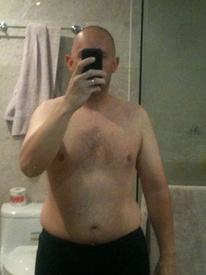I can't seem to eat less than 2300 calories...

LupitaWins12
Posts: 92
Hi, I'm a female 5'8 currently 175 pounds, my goal is to lose 30 pounds. I've lost 65 pounds so far. I exercise 5 times a week, I do TRX and weight train a little bit. I count calories and I'm trying to create a deficit so i can loose 2 pounds per week, but it's very hard for me...I tend to eat healthy but it all adds up to 2300 calorie daily, minus the exercise that leaves at 1800 calories a day which does lead to 1 pound of fat a week. Anyways, what can I do to have a bigger deficit? Or am I doing something wrong? Maybe I just need some encouragement..what do you guys think?
0
Replies
-
2lbs a week, on average, is too much. At that point, unless you're severely overweight, which you arent, you'll start to cut into muscle. You want to keep muscle, it burns cals just by being there. The scale is kind of the devil, you need to do some waist, tummy measurements. You'll see that your body is changing shape, and that your overall weight sometimes doesn't matter. Bust out the tape measure when you do the scale and start that, it can really give you some perspective on whats happening.0
-
Hi, I'm a female 5'8 currently 175 pounds, my goal is to lose 30 pounds. I've lost 65 pounds so far. I exercise 5 times a week, I do TRX and weight train a little bit. I count calories and I'm trying to create a deficit so i can loose 2 pounds per week, but it's very hard for me...I tend to eat healthy but it all adds up to 2300 calorie daily, minus the exercise that leaves at 1800 calories a day which does lead to 1 pound of fat a week. Anyways, what can I do to have a bigger deficit? Or am I doing something wrong? Maybe I just need some encouragement..what do you guys think?
You've lost 65 pounds already. You want to lose 30 more. You're already eating at a deficit. Is it working? Leave it alone. slow and steady wins the race, is sustainable, and is easier to "adjust" when you hit your weight loss goal.
Just keep doing what you're doing, don't mess with success.
ETA: changed "calorie goal" to "weight loss goal" oops!0 -
Thanks so much. Should I measure my waist(etc) every couple of weeks or whats recommended?0
-
Thanks so much. Should I measure my waist(etc) every couple of weeks or whats recommended?
"Recommended" is: Do whatever you need to do in order to motivate yourself and stay committed. If measuring will encourage you, then do it. If not, then don't.
You're overthinking... "move more, eat less" is something you've already mastered. Go do more of it. :^)0 -
After you get to a a lower point, generally, your stomach area, and your butt are what will change in size. So, 2 inches above the navel, at the navel, 2 inches below the navel, and then at your hips. Now, if you do lots of squats or lunges, and gals usually go this route, your hips may not shrink. Most peoples last line of fat though is in that tummy area, and you can see the numbers move as you change shape. I personally measure and weigh once a week, and the same day/time to provide a somewhat constant variable. Weighing everyday isn't very representative of whats going on overall.0
-
the other thing to remember is that the body is efficient. Whatever routine you get into, your body is going to adjust to.
Some people report being able to break through by doing a week at maintenance and then going back into their deficit routine.
Other people simply have to work more and eat less.
The other thing is that 1 pound of fat isn't nothing! It's like the size of a fist. losing one of those every week is good work!
keep it up!0 -
After you get to a a lower point, generally, your stomach area, and your butt are what will change in size. So, 2 inches above the navel, at the navel, 2 inches below the navel, and then at your hips. Now, if you do lots of squats or lunges, and gals usually go this route, your hips may not shrink. Most peoples last line of fat though is in that tummy area, and you can see the numbers move as you change shape. I personally measure and weigh once a week, and the same day/time to provide a somewhat constant variable. Weighing everyday isn't very representative of whats going on overall.
Great, thanks so much for your feedback.0 -
Weighing everyday isn't very representative of whats going on overall.
Unless you do it over a long period and start to recognize the fluctuations for what they are. Water weight due to exercise, food, and your period cycle, can make your weight fluctuate by up to 5lbs/2kgs.
but as has been said, use the method that motivates you. Taking the measurements you need to estimate body fat can be a good motivator and taking pictures.0 -
the other thing to remember is that the body is efficient. Whatever routine you get into, your body is going to adjust to.
Some people report being able to break through by doing a week at maintenance and then going back into their deficit routine.
Other people simply have to work more and eat less.
The other thing is that 1 pound of fat isn't nothing! It's like the size of a fist. losing one of those every week is good work!
keep it up!
Thank you! I'm going to keep pushing...and you're right 1 pound is great and I am not starving myself at 1200 calories.0 -
If you really wanna lose it a little fast but you can't cut hard enough. Just cut 50 calories under everyday until you feel satisfied. Baby steps>Self control>Satisfied.
 0
0 -
it's true that muscle burns calories, but so does fat - at a surprisingly similar rate. If you lose a significant amount of fat, even 5-10 lbs, *be sure* you are adjusting your intake accordingly. Also, if your intake is still not resulting in weight loss, and your BF% and weight are staying the same, you might need to reduce your intake below what the calculators are telling you. Adaptive thermogeneis hits people harder if they have ever been obese. It sounds like you've dropped those pounds, but it will take /years/ to erase the damage that being obese can do to one's metabolism... some people never overcome it. Basically, your body is still operating like it has those 65 lbs of fat cells to feed, and you don't. Strength training is a great way to offset that. Just remember that you will likely have to eat at a lower caloric level than people of the same height and weight who never had those 65 lbs at all. And you will likely need to do it for a long time.0
This discussion has been closed.
Categories
- All Categories
- 1.4M Health, Wellness and Goals
- 395.6K Introduce Yourself
- 44.1K Getting Started
- 260.7K Health and Weight Loss
- 176.3K Food and Nutrition
- 47.5K Recipes
- 232.8K Fitness and Exercise
- 446 Sleep, Mindfulness and Overall Wellness
- 6.5K Goal: Maintaining Weight
- 8.6K Goal: Gaining Weight and Body Building
- 153.2K Motivation and Support
- 8.2K Challenges
- 1.3K Debate Club
- 96.4K Chit-Chat
- 2.5K Fun and Games
- 4.3K MyFitnessPal Information
- 16 News and Announcements
- 1.3K Feature Suggestions and Ideas
- 2.9K MyFitnessPal Tech Support Questions





